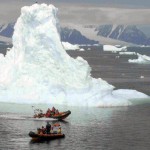New documentary highlights freedom of spirit, not just speech.
by Christa Hillstrom
Uproar. Pogrom. Uprising. That's how Nadezhda Tolokonnikova defines the word "riot" in a new documentary on Pussy Riot, the Russian feminist punk collective that rattled the world last year when three members were arrested for performing an anti-Putin "prayer" in Russia's premier Orthodox church.
Tolokonnikova, better known as Pussy Riot's complex, mysterious, fist-raising "Nadia," is perhaps the most intriguing and provocative figure in Pussy Riot: A Punk Prayer. The film premiered in January at the Sundance festival, where filmmakers Mike Lerner and Maxim Pozdorovkin won the World Cinema Documentary Special Jury Award.






